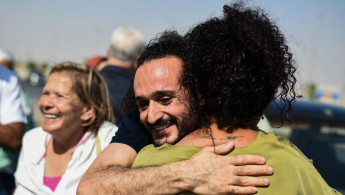Egypt activist Ahmed Douma freed after presidential pardon
Egyptian activist Ahmed Douma, a leading figure in the country's 2011 uprising who has spent the past decade behind bars, walked free from prison Saturday following a presidential pardon.
Douma, now 37, was a leading activist in the 2011 uprising that toppled longtime president Hosni Mubarak. He was arrested in the sweeping crackdown that followed the army's 2013 ouster of Mohamed Morsi, the Islamist president elected after the uprising.
"After 10 years in prison, I wish I could say that I am happy after being released, but I postpone any celebrations till all get freedom," Douma said after leaving Badr prison on Cairo's outskirts -- a facility that has been repeatedly criticised for its poor conditions.
"I wish we can celebrate soon."
Douma was originally sentenced to 25 years in prison in 2015 for clashing with security forces, but this was cut to 15 years in 2019.
Later that year, Egypt's top appeals court upheld the reduced sentence, as well as a fine of six million Egyptian pounds ($372,000 at the time).
In 2021, Douma published a collection of poems entitled "Curly", written while he was held in solitary confinement.
The collection was displayed at that year's Cairo International Book Fair before being quickly pulled for "security reasons".
In one of his poems from prison, Douma writes: "There's no time for depression, no opportunity for sadness, the flood is raging."
Key activists from the revolution remain behind bars, including British-Egyptian pro-democracy blogger Alaa Abdel Fattah, who has spent the better part of the past decade in jail.
After Morsi's overthrow, the authorities rounded up thousands pro-democracy campaigners as well as Islamists in mass arrests that drew international condemnation.
Rights activist Hossam Bahgat welcomed the pardon for Douma, but said the decision was made "without any transparency or understanding of why some people were selected and others ignored".
Fellow activist Ziad el-Elaimi, who was released ahead of Egypt's hosting of the COP-27 climate summit last year, welcomed the news that Douma was finally free after having "nine and a half years of his life stolen".
"The problem remains, however. Someone is using free men as hostages... People are frightened of expressing their opinions freely," he said.
The president has pardoned numerous prominent figures over the past year, but critics have noted that more people have been arrested in the meantime.
"President Abdel Fattah al-Sisi... has used his constitutional powers" to pardon several prisoners including Douma, said lawyer Tarek Elawady, a member of the presidential pardons committee.
Since April last year, authorities have released 1,000 political prisoners, but detained almost 3,000 more, according to Egyptian rights monitors.
In July, Sisi pardoned researcher Patrick Zaki a day after he received a three-year sentence, as well as rights lawyer Mohamed al-Baqer, who was arrested in 2019 while attending an interrogation of Abdel Fattah, his client at the time.
According to Bahgat, founder of the Egyptian Initiative for Personal Rights, the authorities have "become well aware of rising frustration both domestically and internationally".
But "the regime is showing no indication of moving towards ending the crisis of political prisoners in Egypt", Bahgat told AFP.
The pardons come as Egypt conducts a so-called "national dialogue" meant to bring in an opposition that has been decimated during the decade of repression since Sisi came to power.
The president announced on Wednesday he had received the first recommendations of this "dialogue", saying he had "passed them on to the competent authorities so that they can be applied within the framework granted by the legal and constitutional provisions".
Next year, Egypt goes to the polls for a presidential election in which Sisi is widely expected to seek a new term.





 Follow the Middle East's top stories in English at The New Arab on Google News
Follow the Middle East's top stories in English at The New Arab on Google News

![22 Arab countries at COP29 have rejected the targeting of fossil fuels [Getty]](/sites/default/files/styles/image_330x185/public/2024-11/GettyImages-2184289638.jpg?h=199d8c1f&itok=ptHl5bec)
![Dozens of people turned out for the funerals [Getty]](/sites/default/files/styles/image_330x185/public/2024-11/GettyImages-2185229760.jpg?h=e7c891e8&itok=1bctDcE6)